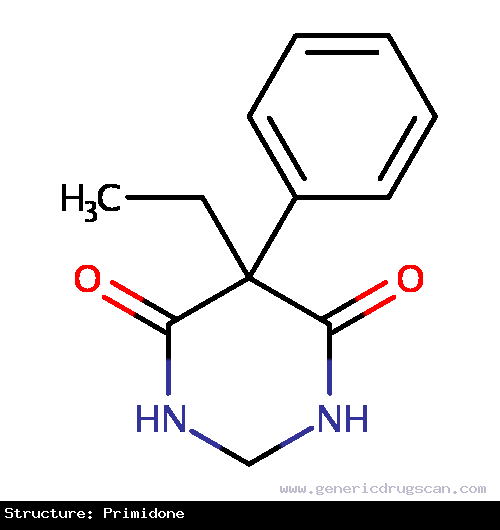Primidone Drug: Indication, Dosage, Precaution, Side Effect , Storage, Category Type and corresponding Brands - www.genericdrugscan.com
Primidone
Drug Status in USA : ApprovedDrug Status in Canada : Approved
pronunciation
pronounced as (pri' mi done)
Why is this medication prescribed?
Primidone is used alone or with other medications to control certain types of seizures. Primidone is in a class of medications called anticonvulsants. It works by decreasing abnormal electrical activity in the brain.
How should this medicine be used?
Primidone comes as a tablet to take by mouth. It is usually taken 3 to 4 times a day. Take primidone at around the same time(s) every day. Follow the directions on your prescription label carefully, and ask your doctor or pharmacist to explain any part you do not understand. Take primidone exactly as directed. Do not take more or less of it or take it more often than prescribed by your doctor.
Your doctor will probably start you on a low dose of primidone and gradually increase your dose, not more often than once every 3 days. If you are taking another medication to treat your seizures and your doctor wants you to begin taking primidone instead, your doctor will gradually decrease your dose of the other medication and increase your dose of primidone over a period of at least 2 weeks.
Primidone may help control your condition but will not cure it. It may take several weeks or longer for you to feel the full benefit of this medication. Continue to take primidone even if you feel well. Do not stop taking primidone without talking to your doctor, even if you experience side effects such as unusual changes in behavior or mood. If you suddenly stop taking primidone, your seizures may become worse. Your doctor will probably decrease your dose gradually.
What are the precautions to be followed?
Before taking primidone,- tell your doctor and pharmacist if you are allergic to primidone, phenobarbital or any other medications.
- tell your doctor and pharmacist what prescription and nonprescription medications, vitamins, nutritional supplements, and herbal products you are taking or plan to take. Be sure to mention any of the following: anticoagulants ('blood thinners') such as warfarin (Coumadin); antidepressants; disulfiram (Antabuse); doxycycline (Vibramycin); griseofulvin (Grifulvin); medications for anxiety, mental illness, and pain; other medications for seizures such as oxcarbazepine (Trileptal), phenobarbital, phenytoin (Dilantin), and valproic acid (Depakene, Depakote); oral contraceptives (birth control pills); oral steroids such as dexamethasone (Decadron, Dexone) and prednisone (Deltasone); sedatives; sleeping pills; and tranquilizers. Your doctor may need to change the doses of your medications or monitor you carefully for side effects.
- tell your doctor if you have or have ever had porphyria (condition in which certain natural substances build up in the body and may cause stomach pain, changes in thinking and behavior, or other symptoms).
- tell your doctor if you are pregnant, plan to become pregnant, or are breast-feeding. If you become pregnant while taking primidone, call your doctor. If you are breast-feeding, call your doctor if your child becomes unusually drowsy.
- if you are having surgery, including dental surgery, tell the doctor or dentist that you are taking primidone.
- you should know that this medication may make you drowsy. Do not drive a car or operate machinery until you know how this medication affects you.
- talk to your doctor about the safe use of alcohol while you are taking this medication.
- you should know that your mental health may change in unexpected ways and you may become suicidal (thinking about harming or killing yourself or planning or trying to do so) while you are taking primidone. A small number of adults and children 5 years of age and older (about 1 in 500 people) who took anticonvulsants such as primidone to treat various conditions during clinical studies became suicidal during their treatment. Some of these people developed suicidal thoughts and behavior as early as one week after they started taking the medication. There is a risk that you may experience changes in your mental health if you take an anticonvulsant medication such as primidone, but there may also be a risk that you will experience changes in your mental health if your condition is not treated. You and your doctor will decide whether the risks of taking an anticonvulsant medication are greater than the risks of not taking the medication. You, your family, or your caregiver should call your doctor right away if you experience any of the following symptoms: panic attacks; agitation or restlessness; new or worsening irritability, anxiety, or depression; acting on dangerous impulses; difficulty falling asleep or staying asleep; aggressive, angry, or violent behavior; mania (frenzied, abnormally excited mood); talking or thinking about wanting to hurt yourself or to end your life; withdrawing from friends and family; preoccupation with death and dying; giving away prized possessions; or any other unusual changes in behavior or mood. Be sure that your family or caregiver knows which symptoms may be serious so they can call the doctor if you are unable to seek treatment on your own.
What are possible side effects of this medication ?
Primidone may cause side effects. Call your doctor if any of these symptoms are severe or do not go away:- excessive tiredness
- dizziness
- difficulty coordinating movements
- nausea
- vomiting
- loss of appetite
- double vision
- uncontrollable eye movements
- decrease in sexual ability
- rash
Primidone may cause other side effects. Call your doctor if you have any unusual problems while you are taking this medication.
How to store the medication and dispose it of after its use later?
Keep this medication in the container it came in, tightly closed, and out of reach of children. Store it at room temperature and away from excess heat and moisture (not in the bathroom). Throw away any medication that is outdated or no longer needed. Talk to your pharmacist about the proper disposal of your medication.
Drug Category/Class
- Anticonvulsants
- Barbiturates
- Nervous System
- Antiepileptics
- Barbiturates and Derivatives
- Cytochrome P-450 CYP1A2 Inhibitors
- Cytochrome P-450 CYP2C9 Inhibitors
- Cytochrome P-450 CYP1A2 Inducers
- Cytochrome P-450 CYP2C8 Inhibitors
- Cytochrome P-450 CYP2C9 Inducers
- Cytochrome P-450 CYP2C19 Inducers
- Cytochrome P-450 CYP2C8 Inducers
- Cytochrome P-450 CYP2B6 Inducers
- Cytochrome P-45
| Prescribed | For the treatment of epilepsy |
| Weight : | 218.2518 |
| Structure | Primidone |
 | |
| Formula | C12H14N2O2 |
Primidone has 1 Brands listed
| Mysoline (250 mg) |
Search Generic Drugs alphabetically
